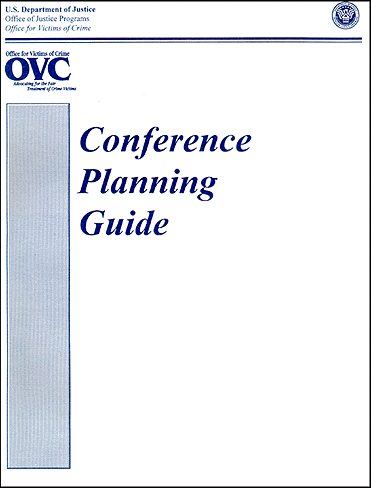
Dear Colleague:
Responding to requests from the field for assistance in planning and organizing diverse training conferences, the Office for Victims of Crime (OVC), U.S. Department of Justice, provided funding for the development of this Conference Planning Guide. Never before has the demand been so great for training and education in the field of crime victim services. The number of people working in State victim compensation programs and local assistance programs, such as shelters, rape crisis centers, child abuse programs and other nonprofit victim services has grown to an all-time high. Thousands more service providers work in prosecutor-based programs and within courts and law enforcement agencies. Recognizing that ongoing training and education are essential to staff and volunteer development, OVC now offers more funding opportunities for State, regional, and national training conferences than ever before.
Contributing to this growth in victim services is a new public concern for the well-being of survivors in the aftermath of crime. Constitutional amendments for victim rights, new crime- victim legislation, court decisions and case law, together with a new body of academic knowledge, clearly demonstrate our changing response to victimization.
Although technical and financial assistance have been made available to Victims of Crime Act (VOCA) State Administrators, the thought of coordinating a statewide conference or hosting a national conference can be intimidating to even the experienced conference planner. Undertaking a statewide or national conference is demanding, but the challenges are not insurmountable. Any conference organizer, given the proper tools, can fashion a conference that is educational, enjoyable, and successful in every respect, even on the first endeavor.
The Conference Planning Guide was developed for persons who are interested in providing education and training to professionals serving victims of crime. The guide is intended to help develop conference planning skills and give an overview of the elements of a successful conference and common practices accepted by meeting planners and the convention industry. OVC hopes to promote the exchange of ideas and knowledge, via regional, State, and local training conferences, to improve the quality of services to crime victims.
This guide was prepared under the guidance of experienced conference planners and professionals from the conference and convention industry. A special thanks to David Migliore, who compiled this guide and conducted extensive research, talking with countless victim advocates and conference planners to incorporate their ideas. We hope that this document will be handy and helpful in planning your next conference. Additional copies of this guide are available through OVC.
Signed by:
| Aileen Adams Director Office for Victims of Crime |
Jackie McCann Cleland Director State Compensation and Assistance Division |
Table of Contents